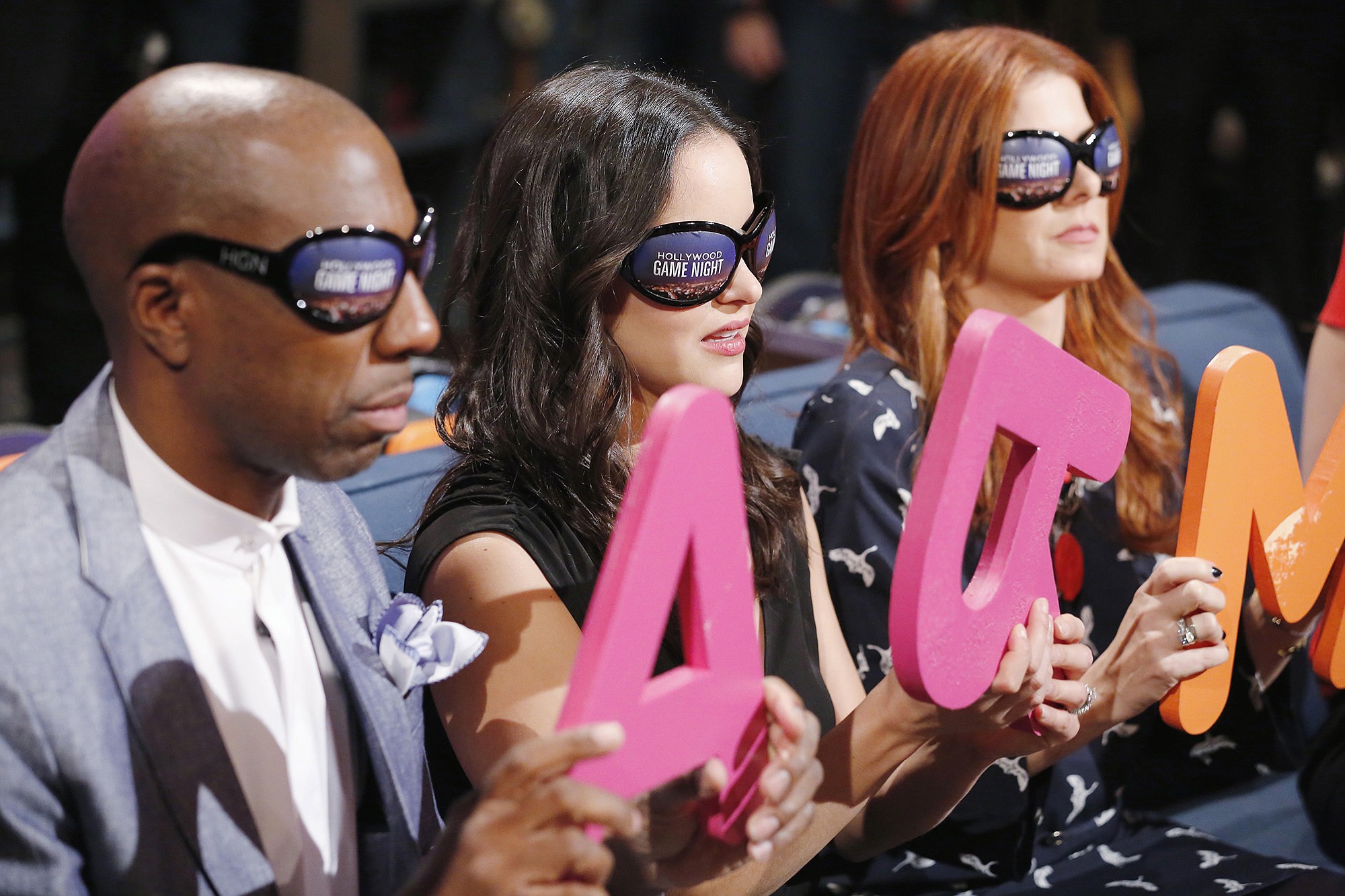Few things on television could seem more pleasingly old-fashioned and simply entertaining than NBC’s “Hollywood Game Night,” which returns for a third, schedule-padding season on Tuesday night.
The show gathers six different celebrities whose fame varies from the C+ list (Turtle from “Entourage”; what’s-his-name from “Grimm”; Penny from “The Big Bang Theory”) to the occasional B+/A- (Amy Poehler, John Legend) for a hip, loungey exercise in the time-honored tradition of watching our stars play a variety of clever party games that draw on our culture’s last remaining expertise: showbiz trivia.
But in a more dispiriting sense, “Hollywood Game Night” also serves as another reminder that we live in a sad, unimaginative era of acquiescence to celebrity status. Large swaths of network TV — from morning shows to late-night, from midday to afternoon to prime time — have been given over to constant, publicist-pleasing opportunities for stars to advance their own brands, unchallenged, and pass off their self-promotion as the very definition of fun. Celebrities no longer have to prove that they are talented; they mostly have to prove that they are always good company.
That’s why there are so many celebs falling over themselves for the opportunity to scream clues to the names of other, slightly more famous movie and TV stars. And here the celebs are again, facing off in the ongoing, insipid “Lip Sync Battle” (currently airing on Spike), which first began as yet one more juvenile segment on “The Tonight Show Starring Jimmy Fallon,” where games-with-stars took precedence over conversation.
Here again are celebs in the deep woods, where they are seen “Running Wild With Bear Grylls” (returning Monday on NBC), eating bugs or rapelling down cliff faces in order to get in touch with some previously untapped, career-elevating sense of strength and stamina. (“I think this has been a powerful journey for Kate (Hudson),” Grylls proclaims in Monday’s episode.)
Change the channel and it’s still more celebs, submitting to explorations of their ancestral family trees on TLC’s “Who Do You Think You Are?” (returning July 26) or on PBS’ “Finding Your Roots.” As well-meaning as they might seem, these programs teach us a small amount of history and more about how to flatter a celebrity’s notions of genetic destiny.
Exalting and deferring to anyone remotely famous comes with a price, as PBS recently learned the hard way with movie star Ben Affleck on “Finding Your Roots.” In the course of filming, the show’s genealogy experts discovered a fact that Affleck didn’t feel like sharing with the public — that his great-great-great-grandfather on his mother’s side had been a Georgia slave owner. Emails that surfaced in the notorious Sony hack last year appeared to show that Affleck had pressured the show’s producers and its star-professor host, Henry Louis Gates Jr., to leave out the slave-owning ancestor. The show agreed to bury it, eventually leading PBS to announce last month that it would postpone future episodes until it can be certain that a central integrity has been restored.
This leads to another, more difficult question: Why would the producers of “Finding Your Roots” (as well as a professor like Gates and a network like PBS) feel the need to build a show around celebrities in the first place? How is a star’s family tree any more interesting than anyone else’s family tree? Are we at the point where a series proposal can’t get a green light unless it’s about famous people?
On a larger point, when did we all start being so subservient to fame, rather than treat it warily and with skepticism, the way we sometimes used to do? Why does the world seem like one long round of “Hollywood Game Night?”
“You sheep would watch paint dry if it was called ‘Celebrity Paint Dry,’ ” Comedy Central’s Daniel Tosh said on a recent episode of “Tosh.0,” as he delivered a particularly disgusted rant against such programming.
Long tradition
Depending on your age and nostalgia track, “Hollywood Game Night” can summon pleasant memories of days off from school in the 1960s and ’70s that were spent watching syndicated game shows (“The $25,000 Pyramid,” “Match Game” or “Hollywood Squares”) in which medium-famous celebs assisted everyday contestants in winning small fortunes, seemingly out of the goodness of their hearts and an opening in their schedules.
Far more physically intense was the occasional prime-time special known as “Battle of the Network Stars” (it ran on ABC from 1976 and sporadically into the 1980s), in which celebs were judged more on their athleticism than their wit and where tempers occasionally flared.
On “Running Wild With Bear Grylls” one can’t help but notice that even the most “dangerous” moments (such as when Grylls and Hudson descend a cliff in Italy’s Dolomite mountains) are captured by cameras from every angle, above and below the precariously dangling star. The real derring-do is accomplished in the editing room.



